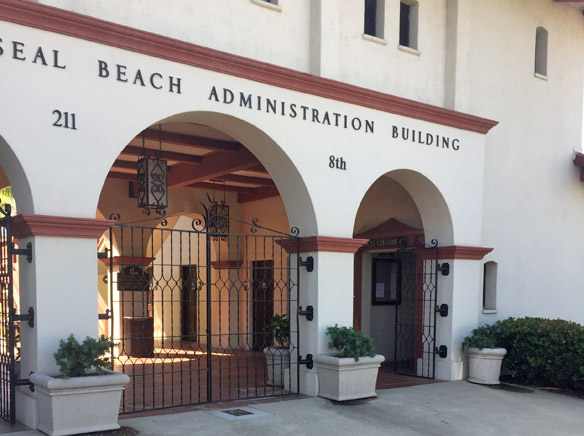The Seal Beach Planning Commission voted 4-1 to recommend a proposed change to the Zoning Code to regulate “additional dwelling units,” also known as “granny flats.” District Two Commissioner Robert Aguilar cast the sole dissenting vote following the Monday, Nov. 5, public hearing on the issue.
However, the four commissioners who voted in favor of the zoning amendment expressed unhappiness with the proposed changes, which are apparently mandated by recent state legislation that limits the ways cities can regulate additional dwelling units.
The issue is expected to go to the City Council on Dec. 10. Planners can only make recommendations to the council about proposed Zoning Code changes.
Old Town and Surfside won’t be affected by the proposed changes, according to the staff report Crystal Landavazo, interim director of the Community Development Department. Planners also directed staff to continue researching ways to minimize the impact of the new rules, which could theoretically allow garages to be converted into apartments.
Only two members of the public spoke at the public hearing, which was publicized in a legally required notice about a zoning text amendment in the Oct. 18 edition of the Sun.
Why is the zoning
change required?
An additional dwelling unit is basically a small place for someone to live in that is on the same property as a larger house.
According to Interim Director Landavazo’s report, Seal Beach passed urgency ordinances to regulate smaller housing units in December of last year and the year before. However, the California legislature passed two new laws late last year, AB 494 and SB 299.
“Like the prior legislation, AB 494 and SB 229 again incorporate State-mandated standards for certain types of ADUs,” Landavazo wrote in her report. The new standards apply to proposed units as well as existing units.
According to the report Old Town and Surfside are exempt from the proposed changes because those areas are built out and there is no room for additional construction.
Potential impacts
and options discussed
Old Town resident Joyce Parque asked how the city was going to know where the additional units are.
Bridgeport Resident Goldberg wanted to know if the zoning amendment’s proposal of a maximum 1,200 feet for a unit was discretionary. He pointed out that the urgency ordinance had made a maximum dwelling size of 800 square feet. He said that if the size was optional, the community needed a discussion.
Goldberg also expressed concern about the potential impact of the changes in local parking.
District Four Commissioner Patty Campbell shared Goldberg’s concerned about garages. She told the Sun that there were 1,739 houses in College Park East, each with garages. “What do they do with their cars?” she asked, apparently referring to the possibility that those garages could be converted into apartments.
District One Commissioner Victor Grgas said he was glad Old Town and Surfside were “off the hook.” He also said there was a huge economic incentive to convert garages to apartments. He said enforcement would be a nightmare.
Campbell said parking was going to be a nightmare.
Grgas asked if the planners had any discretion.
Assistant Attorney Greyson said the law requires a finding to justify a dwelling size of less than 1,200 feet. The city would need a standard to justify the restriction.
Grgas asked if the city could limit a dwelling to a one bedroom addition.
Before the vote, Aguilar expressed concern that there were too many questions about the changes. He said it would be irresponsible to pass the Zoning Code amendment to the council without looking at it further. He said he would vote no.
Planning Commission Chair Michael Thomas, who represents District Three, suggested postponing the decision on the issue until the next meeting. However, Landavazo raised staff concerns that doing so would not allow the city to meet public notice requirements in time to bring the matter to the City Council before the Jan. 1, 2019, deadline to amend the code.
According to Landavazo, if the city didn’t pass its own law by then, state law would take precedence.
District Five Commissioner Mariann Klinger said she would rather have something staff came up with rather than leave it to the mercy of the state legislature.
Multiple planners expressed displeasure at having received the proposed change so late in the year. Greyson and Landavazo indicated that the state legislature had been looking at even greater restrictions on what cities could do.
Landavazo said the regulations allow garages to be converted to living space. She said cities are not allowed under the new laws to require a new garage. Instead, the city could require open parking spaces.
“No,” Greyson said.
Grgas was surprised that garages could be converted without notice to anyone but the city’s building staff.
Campbell said she would like to have more input from city residents.
Thomas said he was not sure everybody in the community knows what’s going on.
Landavazo said staff could absolutely schedule the matter to come back to the Planning Commission.
Thomas proposed continuing the agenda item. He asked staff to research whether anyone in other cities had come up with a way to minimize the city’s exposure to garage conversion.
Assistant City Attorney Greyson said staff would prefer the Planning Commission take action on the issue that night and staff would present additional information to the City Council.
Thomas wanted to look at what other communities were doing.
Grgas reluctantly said all the commission could really do right now was move it forward to the council.
Grgas made a motion that the commission recommend approving the ordinance and have staff research ways to minimize the impact of potential conversions.
As part of the motion, he asked that once the City Council has taken action that staff bring the matter back to the Planning Commission.












